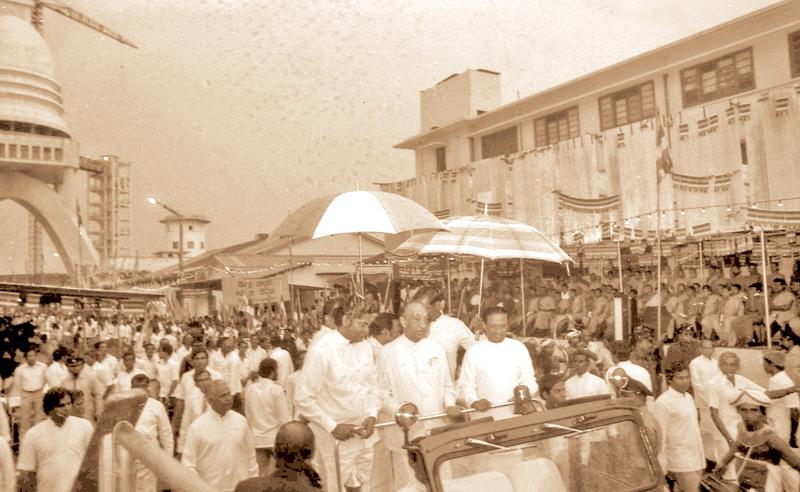
Lalith Athulathmudali cheated death once, but he was not so lucky the second time. He barely survived the grenade attack inside Parliament on August 18, 1987, in which two others were killed. But Lalith, one of the bravest politicians that I have come across in my journalistic career, succumbed to an assassin’s bullet in Kirulapone exactly 25 years ago. To date, many theories on this assassination that rattled an entire nation are swirling around. Regardless of who pulled the trigger, one fact is not up for debate: the cowardly assassin took away perhaps the most brilliant politician of contemporary times from our midst. His brilliance was not only academic – Lalith was an alumnus of both Oxford and Harvard – but even more importantly, it was political too. Lalith was renowned for sheer political acumen and a down-to-earth demeanour. Lalith was truly, utterly genuine and honest.
Lalith had a way with words in any language which enabled him to get his message across to the masses with consummate ease. His command of Sinhala and English was impeccable, but only a few know that he spoke a number of other languages. Once, at an event in Germany, Lalith switched to fluent German during his keynote address, surprising the audience and the interpreters who scrambled to switch again from German to English. Whatever the language, he spoke lucidly and appealed to everyone.
Oratory was not his only forte. Lalith’s multi-dimensional versatility was well known. What set Lalith apart from most other politicians was his vision for the future. Lalith knew the country would suffer if the State neglected the education of its children. He also knew that abject poverty was an obstacle to higher education – although education itself was free all the way to university level, that is only half the story. There are many other expenses from food to travel that every undergraduate has to incur. This was the premise behind the Mahapola Scholarship program, which has been explained in detail elsewhere in this supplement. The actual Mahapola (Big Fair) itself, which raised funds for the scholarships, also became a focal community event. Lalith also had a vision for a strife-free nation. When he was in charge of national security, the conflict had reached a peak. Lalith was in the forefront of the attempts being made to resolve the conflict through a variety of approaches. He was instrumental in turning the largely ceremonial Army to a fully equipped professional outfit. Unlike many other politicians past and present, Lalith did not use battlefield successes to whip up euphoria or score political gains. Racism was anathema to him. He knew that Sri Lanka would go places only if it could resolve the ethnic conflict and create a conducive climate for all communities to live together in harmony.
This sterling quality was one factor that made him rise above communal politics. Lalith was no ordinary politician – he was a statesman par excellence though he did not become President or Prime Minister. The powers that be denied him the latter opportunity and Lalith, Gamini Dissanayake and a few others embarked on a new journey afterwards. However, bitterness or revenge was not on his mind. He simply wanted to carve another path through the Democratic United National Front to take the country in a different direction sans discord and rancour. One cannot thus stop wondering where the country would be today if Lalith lived on. Indeed, politicians like Lalith are a rare breed. It is rare to find a politician untainted with corruption, communalism, bias and hypocrisy. Lalith eschewed all these. Today’s young politicians must study the life and times of Lalith and emulate his ideas and deeds if they hope to shine in the political firmament in the future. Like all politicians, Lalith worked hard to please his constituents in Ratmalana, but he had the ability to focus beyond those confines and reach out to the entire country. He was a truly national-level politician.
This was one reason why every house, every shop and every place of worship had a white flag when the news of his assassination spread. His funeral saw an unprecedented crowd converge on the General Cemetery in Borella. Lalith’s legacy will live on in the hearts of millions who adored him and shed tears when he bade goodbye. His far-sighted vision lives on through the thousands of university students who completed their degree thanks to the Mahapola. If at least some of them aspire to follow in his footsteps to serve the Sri Lankan society with selfless dedication and relentless dynamism, Lalith’s untimely demise would not have been in vain.
